Iran Delivers Its ‘Constructive’ Comments In Nuclear Talks
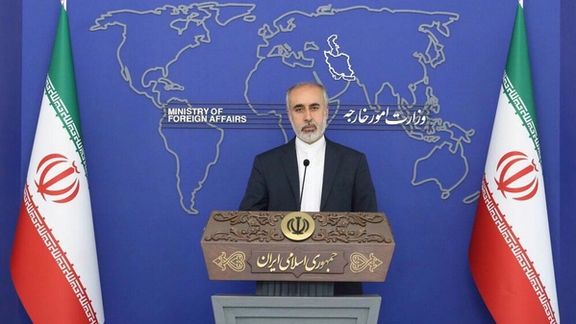
Iran’s foreign ministry says it has finalized its comments on the US response to the EU’s draft for reviving the 2015 nuclear deal and sent it to EU coordinator of talks Enrique Mora.

Iran’s foreign ministry says it has finalized its comments on the US response to the EU’s draft for reviving the 2015 nuclear deal and sent it to EU coordinator of talks Enrique Mora.
Foreign ministry spokesman Kanaani said in the early hours on Friday that the Islamic Republic’s response was prepared based on a "constructive approach."
“After receiving the American response, the expert team of the Islamic Republic carefully examined it and after evaluation at different levels, Iran's response was compiled and delivered to the coordinator tonight,” Kanaani said. "The text that was sent has a constructive approach aimed at finalizing the negotiations."
American journalist Laura Rozen quoted the unnamed EU official as saying that the bloc has received Iran’s response “just now”.
Earlier in the day, French President Emmanuel Macron expressed hope for a renewed Iran nuclear deal as President Ebrahim Raisi proclaimed defeat for US ‘maximum pressure.’
“I hope that in the next few days the JCPOA will be concluded,” Macron told French ambassadors in a Paris speech, referring to the Joint Comprehensive Plan of Action as the 2015 Iran nuclear agreement is officially named.
In Washington, criticism of JCPOA revival has been stepped up both by Congresspeople and the advocacy group, American Israel Public Affairs Committee (AIPAC).
Fifty lawmakers, mostly Democrats sent a letter to Biden on Thursday asking him to “provide Congress with the full text of any proposal to rejoin the Iran nuclear agreement…including any side agreements, and consult with Congress prior to reentering that agreement.”
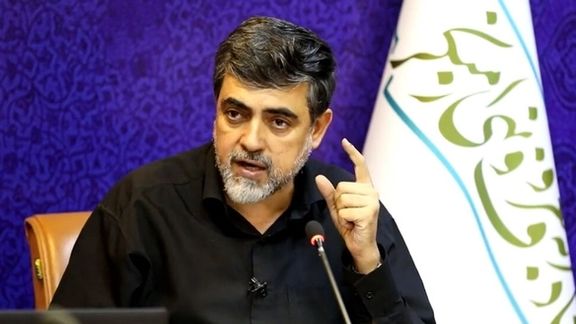
A top official in charge of Islamic morals in Iran has defended gender segregation in higher education, claiming that families will welcome its introduction.
In a video interview earlier this week, Mohammad-Saleh Hashemi-Golpaygani, in charge of a government organization called Enjoining Good and Forbidding Evil Headquarters, claimed that gender segregation in higher education institutions will contribute to the progress of science and knowledge.
“I don't have an answer when I'm asked why students are kept separate before they reach adulthood but are mixed when they go to university,” he said.
Boys and girls are strictly separated from primary school, but most universities are mixed gender.
“Families will welcome gender segregation [in higher education]. They want a safe environment [for their children],” he said wildly claiming that there are twenty-one universities and colleges in the world that segregate including some in the United States. He also claimed that the average grade point rose by 1.5 in these universities after separating men and women.
Hashemi-Golpaygani’s remarks have outraged many on social media and websites and newspapers have criticized him for his controversial remarks.
In an editorial Tuesday, the moderate conservative Asriran told Hashem-Golpaygani that with his “imprudent and incorrect statements” -- including the undocumented claim that many of the world's top universities have implemented gender segregation and achieved better academic results as well as existence of facial recognition software that can help identify women with insufficient hijab -- he obliterates the Islamic concept of ‘enjoining good and forbidding evil’ and provides sensational stories for foreign-based Persian language media.
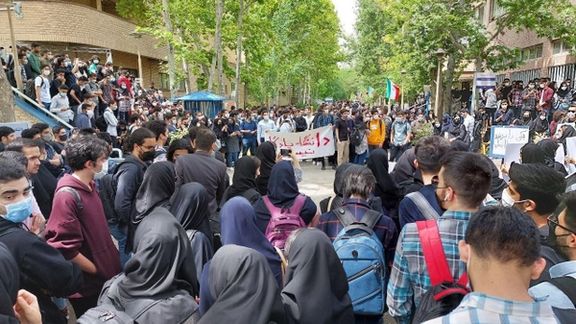
Some social media users have pointed out that Hashemi-Golpaygani’s own daughter has been studying in a mixed-gender university in Belgium.
In the same interview, Hashem-Golpaygani said that public CCTV cameras, including those in metro stations, are programmed to use facial recognition technology to take photos of unveiled women and to compare against photos in a national database to identify those who break the hijab rules. He suggested that the rule breakers be fined in the same way that people are fined for violating traffic regulations.
Hashem-Golpaygani said recently that about half of Iranian women do not abide by the mandatory hijab rules.
In its editorial entitled “Watch Fewer Sci-Fi Movies”, Asriran also told the offical that he should present himself to Iran’s state-run Cinema Organization if he is interested in the science fiction genre. His suggestion that fining hijab-rule-breakers by using blurry CCTV images will help convert them to hijab “would only be possible in sci-fi or comic films,” Asriran wrote.
The website also suggested that such technology, if it were available in the country, would better be used to find dangerous criminals. The police have numerous burglaries, car thefts, and mugging cases on their hands with footage of the culprits who they cannot identify.
In recent months government and security agencies have intensified their efforts to pressure women into abiding by the hijab laws and several rounds of anti-hijab civil disobedience campaigns have followed.
The patrols by the ‘morality police’ have increased on the streets and videos of violent arrests of women and girls as well as confrontations between people and hijab enforcers, including a recent incident in Shiraz which resulted in the closure of the shopping center where it happened, are becoming too common on social media.
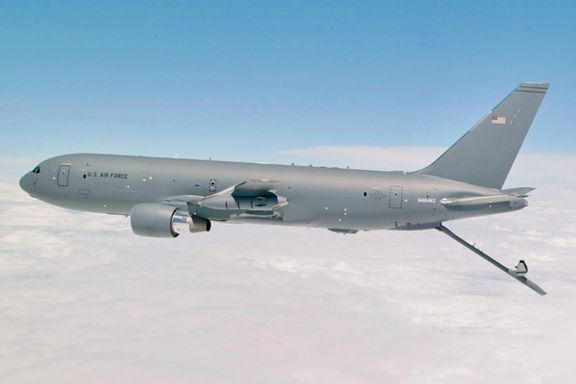
The United States will sell four Boeing KC-46 refueling planes to Israel till 2025, which can facilitate strikes against targets in Iran, some 2,000 kilometers (1,200 miles) from Israel.
Aircraft manufacturer Boeing signed a contract with the US Department of Defense to supply Israel with the Boeing KC-46 Pegasus planes needed for strikes far outside the regular flight range of Israeli jets, the company said in a statement on Wednesday.
They are scheduled to arrive in 2025 at the earliest, so that the Israeli air force can replace its aging fleet of 707 refueling tankers.
Israel has asked that this date be moved up — which would require the US to give up its spot in line to receive the planes from Boeing — but Washington has not accepted the request yet. The potential sale of eight KC-46s to Israel for some $2.4 billion was approved by the State Department back in March 2020.
The announcement came the same day that President Joe Biden had a 45-minute-long phone call with Israeli Prime Minister Yair Lapid, in which the two discussed “global and regional security challenges, including threats posed by Iran.” "The President underscored US commitment to never allow Iran to acquire a nuclear weapon," the White House said in a statement.
“This contract further strengthens the US-Israel alliance and continues the decades-long relationship between Boeing and the Israeli Air Force,” said Ido Nehushtan, president of Boeing Israel. “The KC-46A will benefit Israel’s efforts to ensure national security and regional stability.”
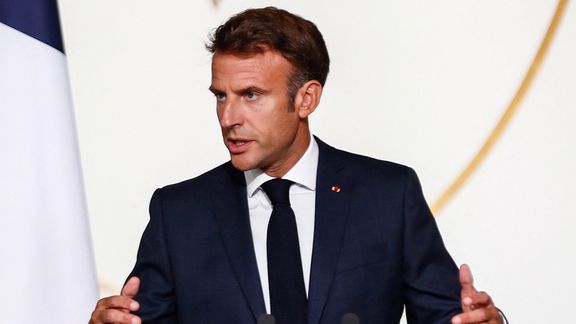
French President Emmanuel Macron expressed hope Thursday for a renewed Iran nuclear deal as President Ebrahim Raisi proclaimed defeat for US ‘maximum pressure.’
“I hope that in the next few days the JCPOA will be concluded,” Macron told French ambassadors in a Paris speech, referring to the Joint Comprehensive Plan of Action as the 2015 Iran nuclear agreement is officially named.
Speaking to a Tehran conference honoring Supreme Leader Ali Khamenei, Raisi suggested United States officials had admitted that ‘maximum pressure’ had been defeated by the “will of the Iranian people” and had led nowhere. “The Islamic Republic will not accept domination,” Raisi said. “Today it has been proved that the Islamic Republic of Iran is…a power that will not bow to domination.”
Raisi’s remarks came as Iran is considering the latest US input, sent August 24 via the European Union, into what appears to be the last stage of 17-month talks designed to revive the JCPOA.
A series of reports, both in the Israeli media and emerging from briefings in Iran, have suggested the talks have come to focus on a stage-by-stage approach to reviving the JCPOA, which former US President Donald Trump left in 2018 while imposing ‘maximum pressure’ sanctions.
JCPOA revival in stages
According to an account given by Axios Thursday citing “sources briefed on the draft,” a third stage, beginning with ‘Reimplementation Day,’ would see the Iranian nuclear program back within JCPOA limits and the ‘full’ lifting of those US sanctions incompatible with the 2015 agreement.
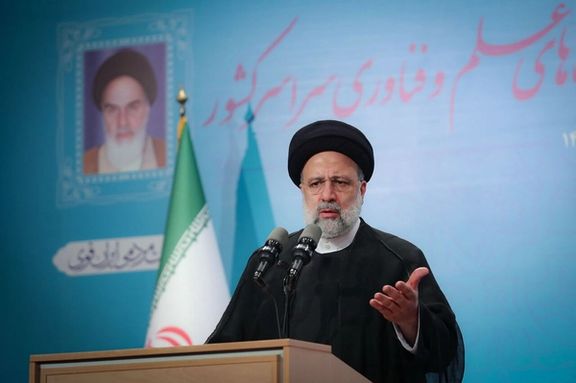
This would effectively postpone until ‘Reimplementation Day’ Tehran’s current insistence, as a condition for JCPOA revival, on the ending of an International Atomic Energy Agency (IAEA) probe into unexplained uranium traces found in Iran.
A US official cited by Axios said that, while there would be interim steps before the third stage – both with Iran restricting its nuclear program and the US easing sanctions – any attempt by Iran by Reimplementation Day to go further unless the IAEA probe ended would risk “delaying the lifting of sanctions.”
Time for progress?
Such a timetable might give IAEA director-general Rafael Mariano Grossi time for progress. It could also avoid confrontation at the IAEA board of governors meeting September 12-16, which comes three months after the board censured Iran over failure to explain the uranium traces to the agency’s satisfaction.
But several senior Iranians, including Raisi, have this week stressed Iran’s commitment to the agency dropping the probe before the JCPOA is restored. Sardar Mohammad Ismail Kothari, a parliamentary deputy for Tehran, said Thursday that the current Raisi government, working closely with parliament, had been effective in pursuing Iran’s rights and in upping uranium enrichment to 60 precent, far above the 3.67 percent JCPOA cap, and near the 90 percent generally deemed ‘weapons grade.’
In Washington, criticism of JCPOA revival has been stepped up both by Congresspeople and the advocacy group, American Israel Public Affairs Committee (AIPAC).
Fifty lawmakers, mostly Democrats sent a letter to Biden on Thursday asking him to “provide Congress with the full text of any proposal to rejoin the Iran nuclear agreement…including any side agreements, and consult with Congress prior to reentering that agreement.”
But proponents of the 2015 agreement have also been active. “Let’s be clear: Trump’s plan of maximum pressure didn’t work,” tweeted Sara Jacobs, a Democrat in the House of Representatives Wednesday. Jeremy Ben-Ami, President of J Street, the “pro-Israel, pro-peace” advocacy group, tweeted Thursday a point-by-point rebuttal of AIPAC’s recent talking points and defended the JCPOA as “the best means of blocking Iran’s pathways to a nuclear weapon.”
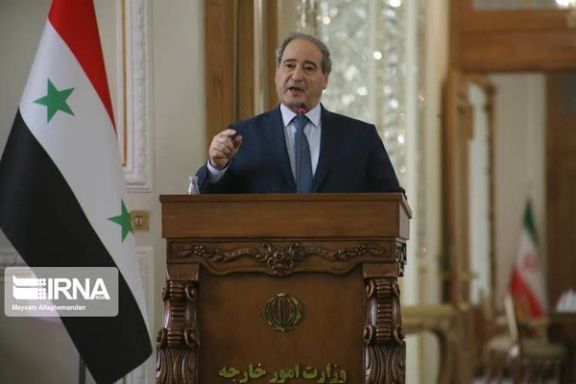
Following Israeli airstrikes on targets around Aleppo and Damascus in Syria, the country’s foreign minister said on Thursday that Israel was "playing with fire."
Israel conducted several airstrikes against the Aleppo International Airport in northwestern Syria, hours before its missiles struck targets southeast of capital Damascus Wednesday night.
According to Syria’s state news agency (SANA), Faisal Mekdad said such attacks by Israel threaten the security of the region, noting that "Israel is playing with fire and is putting the regional military and security situations at risk of an explosion."
"Syria will not remain silent regarding the repeated Israeli attacks and the Israelis will pay the price sooner or later," he warned.
Israel has carried out hundreds of strikes in Syria in recent years, mainly targeting alleged weapons convoys or arms depots belonging to Iran-allied fighters. Iran-backed militias established a foothold in Syria while fighting in support of President Bashar al-Assad during Syria's civil war.
The Wednesday attacks were the first alleged Israeli airstrikes to target the Aleppo airport since 2019 and the second time Israel targeted a Syrian airport this year. On June 10, Israel bombed the Damascus International Airport, causing the airport to go completely out of service for a period of two weeks.
The airstrikes come less than a week after similar airstrikes targeted the Syrian Scientific Studies and Research Center (SSRC) in Masyaf, located southwest of Aleppo, reportedly destroying more than 1,000 Iranian-made missiles.
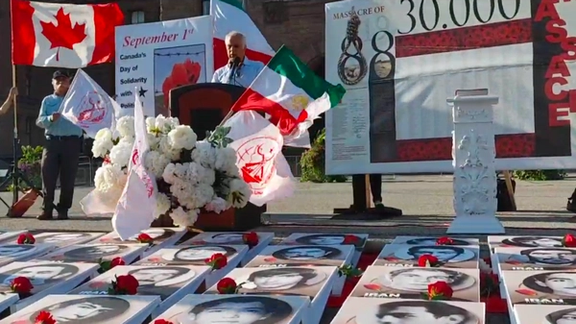
Dozens of Iranian-Canadians held a gathering to mark September 1, the day of solidarity with Iranian political prisoners as per a resolution by the Canadian Parliament.
Many Iranian-Canadians whose family members were killed in a wave of prison executions in 1988, gathered on Wednesday at Queen's Park in Downtown Toronto, Ontario. In 2013, the Canadian parliament condemned the killing of about 5,000 dissidents, and proclaimed September 1 as Solidarity with Political Prisoners in Iran Day in remembrance of the victims.
The participants called on the international community to hold the Islamic Republic accountable for its crimes against humanity as well as its crackdown on dissent.
Demanding justice for the victims of the 1988 mass executions and an end to impunity for Iranian leaders, including President Ebrahim Raisi, they echoed calls by several US politicians that have urged President Joe Biden to deny a visa to the Iranian president, who plans to travel to the UN in New York in September. Raisi is accused of being a member of a death commission that ordered the summary executions.
Raisi’s election as president last June sparked interest in his role in the executions. Agnes Callamard, the secretary general of Amnesty International, immediately demanded that the United Nations Human Rights Council investigate him for crimes against humanity.
Most of the approximately 5,000 prisoners executed in 1988 were members or sympathizers of the Albania-based exiled opposition group Mujahedin-e Khalq (MEK) serving their sentences, with a lower number of executions of leftists. The MEK has claimed 30,000 members died, and in 2019 launched a booklet Crimes Against Humanity naming 5,000.